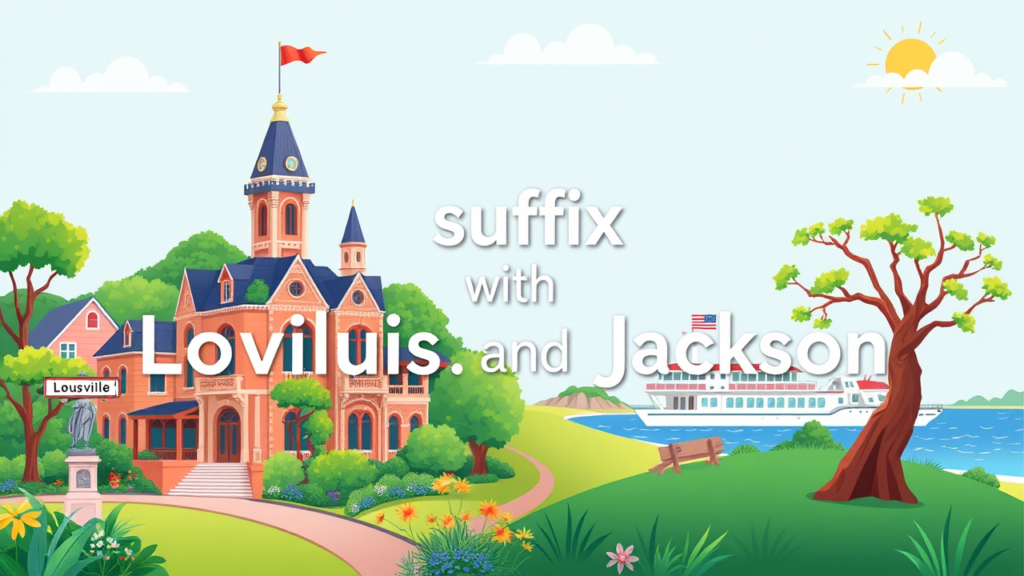Have you ever wondered what connects names like Louisville and Jacksonville? Or why does “Jackson” feel so familiar yet distinct? The answer lies in something simple yet intriguing: suffixes! Today, we unravel the suffix with Louis and Jackson, diving deep into its meaning, history, and surprising presence in our everyday lives. Buckle up—this journey blends fun facts, curious questions, and a sprinkle of “aha!” moments to keep you hooked. Ready to dig in? Let’s go!
Why Do Suffixes Matter in Names?
Think about it: names don’t just pop out of nowhere. They tell stories, carry legacies, and sometimes even hint at where someone—or something—comes from. Suffixes act like little clues tacked onto the end of words, giving them flavor and purpose. When discussing the suffix with Louis and Jackson, we ask what ties these two names together. What makes them pop up in cities, surnames, and maybe even your family tree? Spoiler alert: it’s all about “-ville” and “-son,” but we’ll get there step by step.
So, why should you care? Because understanding these suffixes opens a window into history, culture, and even geography. Plus, seeing how a tiny ending can shape something as big as a city’s identity is fun! Let’s break it down and see what’s cooking with “Louis” and “Jackson.”
Where Does “Louis” Meet Its Suffix?
First up, let’s tackle “Louis.” Picture a regal French king, Louis XVI, sporting a fancy wig and crown. That’s the vibe this name brings. It’s rooted in the Old German “Chlodovech,” meaning “famous warrior,” and it’s been a favorite among royalty for centuries. But what happens when we slap a suffix on it? Enter the suffix with Louis and Jackson, specifically “-ville.”
Take Louisville, Kentucky, for instance. This city’s name honors King Louis XVI, who helped the American colonies during the Revolutionary War. The “-ville” part? It’s French for “town” or “village,” a nod to the settlers who brought their language across the Atlantic. So, Louisville means “Louis’s town.” Cool, right? But here’s a question: why stop there? Cities like St. Louis, Missouri, also carry that royal vibe, though they skip the “-ville” suffix for a more straightforward twist.
What’s the takeaway? The suffix with Louis and Jackson—at least for “Louis”—loves “-ville” because it ties a famous name to a place. It’s like a historical handshake between a person and a patch of land. But does “Jackson” play the same game? Let’s find out!

How Does “Jackson” Join the Suffix Party?
Now, shift gears to “Jackson.” This name feels a bit more down-to-earth. It’s English through and through, meaning “son of Jack.” That’s where the suffix with Louis and Jackson gets juicy—because “-son” is baked right into the name itself! “Jack” started as a nickname for “John,” and adding “-son” turned it into a family affair. Think of it as a medieval way of saying, “Hey, I’m Jack’s kid!”
But wait—there’s more! While “-son” defines “Jackson” as a surname, the suffix with Louis and Jackson shines in places like Jacksonville, Florida. Named after Andrew Jackson, the seventh U.S. President, this city swaps “-son” for “-ville,” just like Louisville. Suddenly, “Jackson’s son” becomes “Jackson’s town.” Isn’t that a neat twist? It’s almost like the name grew up, traded its family roots for a civic title, and planted itself on the map.
So, what’s the big question here? Why do both “Louis” and “Jackson” cozy up to “-ville” in city names? Let’s dig deeper into that shared suffix and see what it reveals!
Why Is “-Ville” the Star of the Suffix with Louis and Jackson?
Here’s the million-dollar query: what makes “-ville” the go-to for the suffix with Louis and Jackson in places like Louisville and Jacksonville? The answer lies in history and a dash of French flair. Back in the day, French explorers and settlers roamed North America, leaving their mark on the landscape. “Ville,” meaning “town,” stuck around because it’s short, catchy, and gives any name a sense of community.
Imagine you’re naming a new settlement. You’ve got a hero in mind—maybe a king or a president. Adding “-ville” turns their name into a living, breathing place. Louisville honors a French king’s legacy, while Jacksonville celebrates an American leader’s grit. The suffix with Louis and Jackson bridges two worlds: European elegance meets rugged New World ambition. Pretty cool, huh?
But let’s not gloss over this: “-ville” isn’t exclusive to these two. Nashville, Greenville, and dozens of other “-villes” dot the U.S. map. So, what sets the suffix with Louis and Jackson apart? It’s the names themselves—loaded with historical weight and personality. Ready to see how they stack up? Let’s roll out a table to compare!
Biography Table: The Suffix with Louis and Jackson
Here’s a handy breakdown of everything you need to know about the suffix with Louis and Jackson, from origins to famous examples.
| Aspect | Louis with Suffix | Jackson with Suffix |
|---|---|---|
| Root Name Meaning | “Famous warrior” (Old German: Chlodovech) | “Son of Jack” (English, from John) |
| Key Suffix | -ville (town/city) | -son (son of), -ville (town/city) |
| Origin of Suffix | French (“ville” = town) | English (“-son” = lineage), French (“-ville”) |
| Famous Place Example | Louisville, Kentucky (after Louis XVI) | Jacksonville, Florida (after Andrew Jackson) |
| Historical Context | Tied to French influence in America | Linked to English naming traditions |
| Other Examples | St. Louis, Missouri (no “-ville” but related) | Jackson, Mississippi (no “-ville,” just name) |
| Cultural Vibe | Royal, elegant, historical | Practical, familial, leadership-focused |
| Fun Fact | Named for a king who never visited America | Andrew Jackson never lived in Jacksonville |
Can the Suffix with Louis and Jackson Go Beyond “-Ville”?
Okay, “-ville” steals the show for places, but what about other suffixes? Does the suffix with Louis and Jackson ever switch things up? For “Jackson,” the “-son” suffix is a built-in classic. It’s a surname staple—think Johnson, Wilson, or Peterson. But “Louis” gets trickier. You won’t find “Louisson” on many maps, though it could theoretically mean “son of Louis.”
What about something like “-iana”? Louisiana flips the script, tying “Louis” to a whole state, not just a town. The “-iana” ending hints at a broader territory named after Louis XIV. It’s not as common as “-ville,” but it shows how flexible the suffix with Louis and Jackson can be. Ever heard of “Jacksoniana”? Probably not—it’s not a thing! But it sparks a fun “what if” moment.
Here’s the kicker: suffixes adapt. They morph with culture, geography, and imagination. So, while “-ville” reigns supreme for the suffix with Louis and Jackson, other endings like “-son” and “-IANA” add layers to the story. What do you think—should we invent a new suffix for these names?
How Does the Suffix with Louis and Jackson Shape Our World Today?
Let’s bring this home: why does the suffix with Louis and Jackson still matter in 2025? Cities like Louisville and Jacksonville aren’t just dots on a map—they’re thriving hubs with personalities shaped by their names. Louisville’s Kentucky Derby screams tradition, while Jacksonville’s sprawling size reflects bold growth. The suffixes tie them to their past and push them into the future.
And it’s not just about places. Surnames with “-son”—like Jackson—pepper family trees everywhere. They’re eco-friendly in a way, recycling ancestral names for new generations. Meanwhile, “Louis” inspires everything from luxury brands (hello, Louis Vuitton!) to jazz legends (Louis Armstrong rocked that name). The suffix with Louis and Jackson keeps evolving, proving that a little ending can carry much weight.
So, what’s your take? Have you ever met a Jackson or visited a “-ville”? These suffixes connect us—to history, each other, and the places we call home.

What’s the Verdict on the Suffix with Louis and Jackson?
After this deep dive, what stands out? The suffix with Louis and Jackson isn’t just a linguistic quirk—it’s a storytelling tool. “-Ville” builds towns from famous names, while “-son” roots us in family ties. Together, they weave a tapestry of history, from French kings to American presidents, all wrapped in a fun, approachable package.
Next time you hear “Louisville” or “Jacksonville,” give a little nod to the suffix with Louis and Jackson. It’s more than a word ending—it’s a bridge to the past, a marker of identity, and a reason to smile at how clever naming can be. What’s your favorite “-ville” or “-son” story? Please share it with someone and keep the curiosity alive!































Comments 1